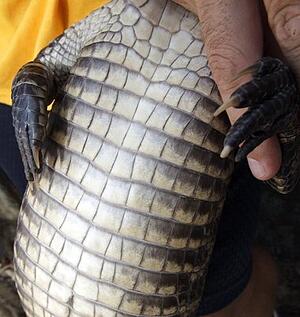 Exotic leather can come from a variety of sources depending on the specific species of animal the leather is from. For some types of exotic leather, such as stingray skins, the primary source of the leather is from wild animals. For other types of exotic leathers, such as alligator skins, the primary source of leather comes from farms.
Exotic leather can come from a variety of sources depending on the specific species of animal the leather is from. For some types of exotic leather, such as stingray skins, the primary source of the leather is from wild animals. For other types of exotic leathers, such as alligator skins, the primary source of leather comes from farms.
Typically speaking, exotic leathers that come from farms tend to be of a higher quality than those that come from wild sources. This is why tanneries such as Pan American Leathers often partner with farms for their supply of alligator skins.
Here’s how alligator farms ensure top-quality exotic leather production:
1: Raising Alligators in a Safe Environment
In the wild, animals, even alligators, are faced with innumerable threats. Alligators in the wild can be injured by predators (including other alligators) and even by prey animals that fight back.
These injuries damage the alligator’s hide, resulting in a lower-grade skin that has holes, scratches, and other marks. Such marks can ruin the aesthetic appeal of the finished product.
Farms keep gators in controlled environments that eliminate the risk of injury by predators and random acts of nature, keeping their hides safe from harm.
2: Improving Alligator Diets
Alligators are opportunistic feeders in the wild, eating nearly anything they can get. While a lack of pickiness can make them successful hunters, the tendency to eat just about anything can prove unhealthy for alligators, which can affect the quality of their hides.
Alligator farms carefully control the diets of their livestock, making sure that each alligator gets the nutrients needed to grow large and healthy, improving the quality of the gator’s hide. According to NT News, some farms are even experimenting with a “new corn-rich diet to improve their skin for future handbags and leather.”
By controlling the diet of their livestock, alligator farms can produce healthier animals and higher-quality skins.
3: Humanely Harvesting Skins
Top-quality skins don’t come from abused animals. The best farms follow the principles of animal welfare, including providing proper food, water, handling, healthcare, and a humane end at harvest time.
Wild animals don’t always get a clean death. The conditions aren’t as controlled, so there is more of a fight to put down the gator, resulting in damage to the hide.
Ultimately, by providing a controlled environment and diet for alligators, farms can better protect and raise the animals, creating better hides. The best farm operators know that by providing better environments for their alligators, they can create better hides to get a greater return on their investment in raising the animals.
Pan American Leathers works with some of the best alligator farms to get high-quality alligator skins to turn into leather. Find out more about how to get the best alligator skin for your next exotic leather project today!



